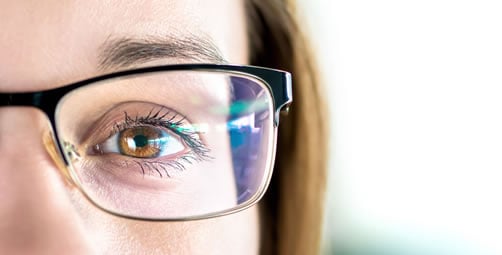
Depending on who you are, having to get a new pair of glasses can be an exciting time or can be seen as an unnecessary expense. Regardless of how you feel, replacing your glasses is crucial for maintaining clear vision and eye health. So how often should you replace your prescription glasses?
Optometrists recommend replacing your glasses everyone one to three years. This can be shorter depending on the condition of your lenses or any changes in prescription.
Changes to Your Prescription -
Most opticians would recommend getting an eye test every 2 years. This means that during the time in between replacing your glasses, your prescription could change drastically. Using an out-of-date prescription can have many negative effects on your eyes. These could include, but aren't limited to; Eye strain, distortion and headaches. When it comes to an out-of-date prescription, it is better to be safe than sorry.
Old or faulty prescriptions could have a variety of effects on your eyes. We mentioned some of these effects earlier but what should you look out for? Old prescriptions could lead to a decrease in visual acuity with vision becoming distorted or leaving you seeing double. Another telltale sign of an old prescription is objects becoming blurry, especially those further away. If you find yourself having to squint to see these objects more clearly, it might be time to update your prescription. Feeling relieved or more comfortable after taking off your glasses? Time to update your frames. Eye strain is one of the most common symptoms of an old prescription. Your lenses should feel comfortable to look through. If they aren't, it's time for a new pair.
Getting new glasses is a great excuse to go for an eye test. You're getting new glasses, why not go for a new prescription as well? Visit your optician for an eye test and ensure your eyes are looking through lenses with an up-to-date and accurate prescription.
New Tech -
If you've had the same glasses for a number of years, you may be missing out on improvements in the technology. New lenses come with a plethora of useful coatings. From blue light to MAR and anti-scratch, these coatings are designed to both improve the usefulness of your lenses and increase their lifetime. New tech can be a great reason for you to replace your prescription glasses.

- Blue Light Control- Many of the devices we use every day such as; Computer and television screens, smartphones, tablets all emit blue light. Over-exposure to this light can cause eye-strain, fatigue and sleeplessness. Blue Light Control neutralises the light and prevents eye strain and fatigue, making for more relaxed vision and healthier eyes.
- MAR - Multi Anti-reflective coating helps to eliminate any annoying reflections on your lenses. It also helps to reduce glare when looking at a screen or when driving at night. In addition to this, it helps to improve the overall look of your glasses, eliminating reflections and making them look almost invisible.
- Anti Scratch - No coating can make your lenses completely scratch-proof but this certainly adds a much-needed layer of protection to your lenses.
- UV Coating - UV protective treatments help to protect your eyes from the sun's harmful UV rays. Think of it as sunscreen for your eyes.
Fashion -
Glasses aren't just functional. They can be stylish fashion accessories as well. Changing seasons or new fashion trends can be a great reason for a new pair of specs. Your prescription glasses can be the missing piece in the puzzle for tying an outfit together. Your new glasses don't have to replace your old ones. They could be saved for special occasions or more formal events, making your outfits stand out even more.
Sunglasses -
Now you know how often you should replace your prescription glasses, what about your sunglasses? If you have a pair of prescription sunglasses, these will need to be replaced in a similar time frame to your regular glasses. If your prescription has changed and you've replaced your glasses, it is a good time to also update your sunglasses.
Non-prescription sunglasses don't need replacing as often as prescription glasses as long as you take good care of them. The only real need for them to be replaced is if the lenses or the frame itself become damaged. The lens coating can become damaged and flaky, if this is the case, it's best to get them replaced. Loss of coating can leave your eyes more exposed to harmful UV rays in particular. Whether your sunglasses are damaged, bent, misaligned or simply going out of fashion, a new pair can rejuvenate your look and help protect your eyes.
Reglaze -
Need new lenses but don't want to part with your favourite glasses? Reglazing gives you the best of both worlds. This process allows you to update your lenses without changing your frames. Revitalise your eyes without having to restyle your look.
Regardless of the condition of your frames or lenses, we recommend updating them every 1-3 years to maintain healthy eyes and clear vision.
Looking to pick up your own pair of new glasses or sunglasses? At Spex4less we’re sure to have the perfect frames and lenses for you.
